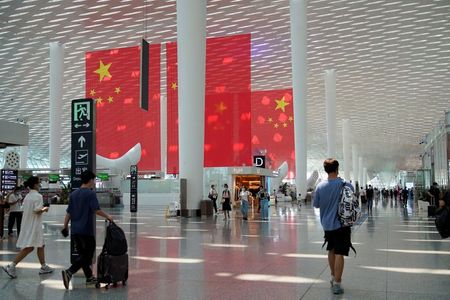BEIJING (Reuters) – China’s tight restrictions on international travel as part of its zero-tolerance approach to controlling COVID-19 are the top concern for British firms operating in the country but they are more optimistic than last year, a survey showed on Tuesday.
“Opaque, inconsistent travel and visa policies have made it extremely difficult to bring foreign staff into China,” the British Chamber of Commerce in Beijing said.
While other countries in Asia have slowly opened up their borders to international travel, China still has strict curbs in place involving long quarantines and limits on flights and visas.
“China today is physically more isolated from the world than at any time since entering the World Trade Organisation twenty years ago. As international travel starts to recover globally, the contrast with China is striking,” the chamber said.
Its survey, which had 288 respondents, showed nearly a quarter of companies saw foreign staff numbers fall in 2021, and 41% expect numbers to decrease significantly next year on concerns over separation from family or friends or uncertainties over being able to come back.
Business groups representing European and American companies have voiced similar concerns.
China has defended its COVID control measures as an effective way to protect its citizens and officials have said they will not change any time soon, although the country has pledged to ease rules slightly for U.S. business travellers.
The British survey said recovery from pandemic-related disruption had been “fragile,” but firms are more optimistic about prospects in China than they were last year.
Around two fifths of businesses expect earnings in 2021 to exceed pre-pandemic levels, and nearly half expect them to increase from last year, it said. In 2020’s survey, only 30% of companies expected earnings to be higher than the year before.
Nearly half of respondents were from the professional services, education, and advanced manufacturing and transportation sectors.
Other concerns companies raised included the uncertainties of China’s cybersecurity regulations and rising labour costs.
(Reporting by Gabriel Crossley; editing by Philippa Fletcher)










